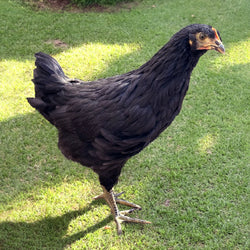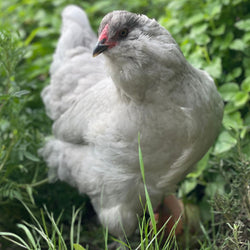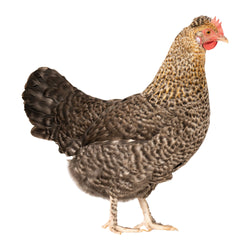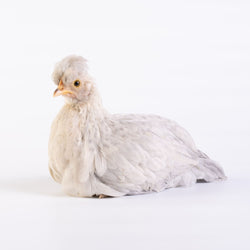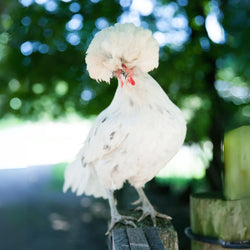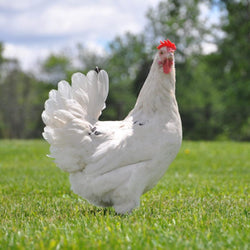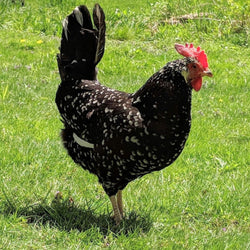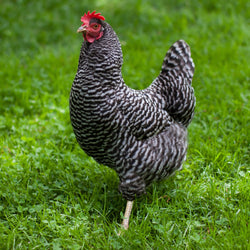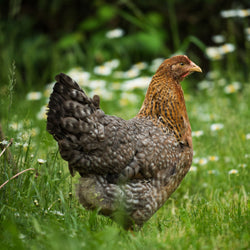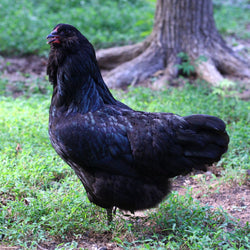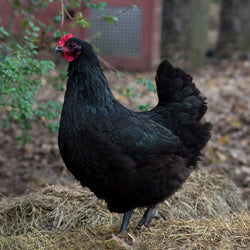page=5/--
Frequently Asked Questions
Here we answer the most commonly-asked questions about ordering, chicken care, and more.
What can I do to reduce the risk of my birds getting sick with Salmonella or another illness?
The easiest thing to do is simply to provide your birds with safe, roomy, clean conditions. Research has shown that a diet of whole grains and seeds is associated with decreased Salmonella colonies -- so start there! We offer these treats that fit the bill: Farmer's Helper Optimal ForageCake Supplement Sunflower Sensation Organic Chicken Crack Sounds easy. Too easy, right? Especially since, if you're even reading this, you're probably already a responsible chicken owner concerned with providing your flock the best care you can... so you've undoubtedly provided lots of space and clean conditions to begin with. But consider this:...
Read MoreMy hen's beak tip broke off. What should I do?
This can occasionally happen, although it is rare. A chicken's beak will continue to grow throughout her lifetime, so as long as it is just the tip, her beak should grow back with no problems. Normally, her beak will slowly wear down with use, but if her beak grows faster than it wears, the tip may break, or a break can be caused by an injury. Possibly your chicken caught her beak somewhere and broke it trying to escape. In any case, check your coop and feeders to make sure there is no place to catch a toe or a...
Read MoreWhat can my chicken's comb tell me about his or her health?
A chicken's comb can be indicative of her circulation and condition. For instance pale pink, shrunken combs may indicate anemia, a mite infestation or something else like a serious illness. When hens are not laying (for instance during a molt or during the winter), their combs will be smaller and paler, too. A red comb can indicate health. A BRIGHT red comb may mean your hen has a fever and is flushed. Blueness to the comb can indicate poor circulation or simply cold, the way your fingernails might get a bluish cast to them if you get very cold. Frostbite...
Read MoreShould I be concerned that my hen laid an egg with blood on the shell?
When a hen has just begin laying, there can occasionally be a little blood on the egg shell, but it is usually no cause for concern. Eventually her vent gets used to stretching when she lays, and becomes very elastic. However, at first it does occasionally happen that with a large egg she might bleed just a little. And it can happen, too, to an older hen if she lays an egg larger than she is used to. If there is a lot of blood, if there is blood every single day, or if you see blood on your hen's...
Read MoreWill my lawn be safe for my pet chickens at the same time it's safe for dogs or cats, after the exterminator has sprayed it?
Well, having your lawn sprayed with pesticides while you are keeping chickens isn't a good idea---it isn't something most of us would ever want to risk with our flocks and our families. However, if you want to weigh your options, you would need to know exactly what sort of poison your exterminators will be using and in what concentrations. Remember, there are lots of different toxic chemicals used to exterminate bugs, so there's no pat answer as to whether extermination on your yard will be safe for your chickens. However, if your exterminator cannot answer your questions about the chemicals...
Read MoreWhat do I need to know about foxes if I keep chickens?
Name: Fox Vulpes spp. Description: *Many different species of reddish or greyish, dog-like mammals with long bushy tails *Up to 3 feet long (excluding tails, which may add another 2 feet), and weighing up to 22 lbs average (record is 26.5 pounds) Distribution/Habitat: Various species are found throughout the world Hunting Behavior: Foxes will not appear in suburban settings as often as raccoons or opossums, but they are still a danger. They will normally stake out your coop beforehand so they know when to strike, grab a bird, and how to get away fast. If they get inside an enclosed...
Read MoreHow do I know if my chick died from Marek's disease?
You're not wrong to be upset at the loss of your pets, of course, but if you're upset at your hatchery for suggesting that deaths weren't related to Marek's disease or asking questions about your brooder set up, your anger is misplaced. Of course it's upsetting when your pets die! However, according to the Merck Veterinary Manual, Marek's Disease can develop in chickens as young as three weeks old, not younger. Since your chicks weren't even old enough to show the first symptoms, whatever they died from couldn't have been from Marek's, whether they were vaccinated, not vaccinated, badly vaccinated...
Read MoreHow do I dispose of a dead chick or chicken?
This is a difficult question to answer definitively, since what to do with a dead pet or animal can vary depending on your your state, city and even your neighborhood. It can vary depending on the cause of death, too. In some places, it's fine to bury a dead animal, while other places may have restrictions. Some veterinarians can dispose of your dead pet for you, while in other places your local vet will not offer that service, but your sanitation service might. The best way to discover your own local requirements would be to contact a local vet and...
Read More







"The Clubhouse" Coop
Easy to assemble and built to last, the Clubhouse Coop is the perfect starter coop for a small flock.
